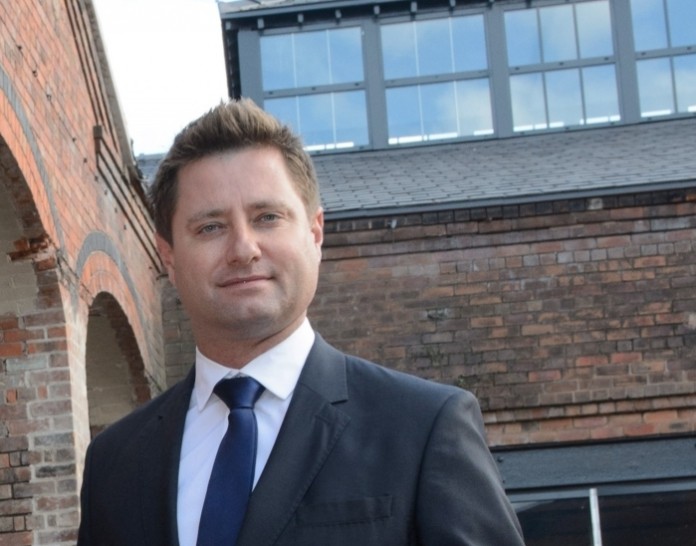The University of Wolverhampton hosted a visit by celebrity architect, George Clarke – showing him amazing spaces at the Springfield redevelopment project.
George Clarke is an architect, creative director of George Clarke + Partners, and a founder of TV production company Amazing Productions. He is the presenter of several successful series for television, including Channel 4’s Restoration Man and The Great British Property Scandal and George Clarke’s Amazing Spaces.
Acclaimed architect and Honorary Graduate, George Clarke, visited the £100 million Springfield regeneration project taking a tour of the Elite Centre for Manufacturing Skills Hub (ECMS) and the West Midlands Construction University Technical College (WMCUTC) at the site before hosting an evening reception in the University’s Chancellor’s Hall.
Business leaders from across the region including representatives from the Chartered Institute of Building, Dunton Environmental, Harrison Clark Rickebys Law, the Institute of Demolition Engineers, Shaylor Group, Rider Levett Bucknall and Pennycuick Collins attended the evening reception to hear George’s perspective on skills in construction and inspiring the next generation of industry leaders.
George said: “The Springfield redevelopment is a big site with lots of difficult buildings on there that all need careful restoration – it’s a long term project but it’s already taking shape with the WMCUTC already open and the ECMS almost completed.
“Inspiring the next generation means everything to me. You need to be inspired to want to do something, whether it’s someone inspiring you like my Grandad did, or just being passionate about what you love to do. Everything that is happening here is fantastic. Springfield gives young people a foundation to do something brilliant starting from a very young age and it’s a real inspiration to see the pathways that are being created.
“Seeing kids being as passionate about architecture and built environment as I am is a dream. They were brilliant, getting a buzz from the day and they were really proud of their work.”
Johanna Stant, WMCUTC student, showed George her work including an electric ‘vertical variation’ cello that she had designed when she was exploring space saving ideas. She said: “I wrote to George when I was in Year 11 asking him if I could do some work experience with him so it’s really exciting to actually meet him. He has been a real inspiration to me and I’m hoping to study architecture in more detail in the future.”
Nazira Karodia, Dean of the Faculty of Science and Engineering at the University, said: “It was wonderful that George took the time to visit us to catch up on the progress made in the first phase of this ambitious project whilst at the same time highlighting that there are opportunities for developers, investors and partners to work with us on phase two of the project.
“Construction is a vital growth sector for the Black Country with the global construction industry forecast to grow by more than 70% over the next ten years. The new super campus will be well placed to take advantage of this rising international demand with strengths in architecture, engineering and sustainable construction – all designed to address the national skills shortage of engineers and construction workers.”
The site of the former Springfield brewery has been transformed into Europe’s largest specialist construction and built environment campus, bringing together businesses and the education sector to maximise impact on the economy.
Since its purchase in 2014, the derelict site has been rejuvenated into a centre of excellence for construction and the built environment, delivering an unbeatable skills pathway for construction education and training from the age of 14 to senior professionals.
As the home of the West Midlands Construction University Technical College, the University’s School of Architecture and Built Environment, and the Elite Centre for Manufacturing Skills, it’s central to our vision of enhancing the student experience and supporting business growth.
The £100 million development is acting as the catalyst for economic and social regeneration, tailored to creating jobs and delivering the technical and professional experts required by the industry.





















